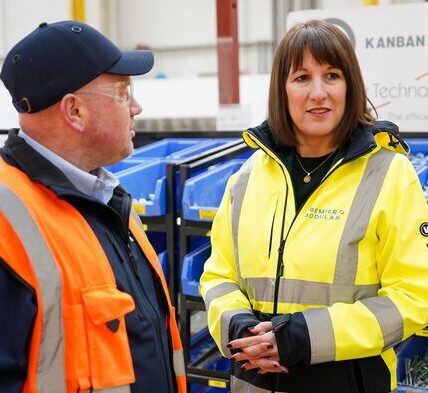The Chancellor could be forced to hit income tax, National Insurance or VAT
Rachel Reeves may target millions of middle-income earners with punishing income tax hikes as she is forced to clear up Labour’s welfare mess. The under-pressure Chancellor could also have VAT and national insurance in her crosshairs as experts predicted she needs to plug up to a £40billion black hole this autumn.
Ms Reeves herself has reluctantly admitted that there would be “a cost” to this week’s humiliating U-turn on welfare reform, which she said would be “reflected in the Budget”. She has insisted she won’t change her fiscal rules, leaving tax rises as the most likely option.

Rachel Reeves in tears sat behind PM Keir Starmer (Image: BBC Prime Minister’s Questions)
It is clearest hint yet that taxpayers are set to be penalised for the Government’s capitulation to Labour MPs opposed to any attempt to bring Britain’s bloated benefits bill under control as Sir Keir Starmer tried to fight off a rebellion.
Economists have warned that the looming crisis in the public finances could leave the Chancellor with an eye-popping £30 to £40billion to find.
That is equal to the sum raised by her record tax-raising Budget in 2024, which was blamed for bringing economic growth to a halt and which she promised not to repeat.
Paul Johnson, the outgoing director of the Institute for Fiscal Studies, said the only way for the Chancellor to raise “big money” was to target income tax, National Insurance and VAT for middle-income earners.
He told the BBC: “If we’re looking at £30billion, which is, quite plausible, I can’t see a way in which you raise that kind of money without hitting people on middle incomes, as they did, of course, with the national insurance increases last year.
“If you’re looking for big money, then it has to be, I think, something in income tax, National Insurance and VAT.
“And to raise that kind of money, you’re looking at people on middle kinds of income.”
Mr Johnson the Chancellor may have to break Labour’s election manifesto pledge of ruling out increases in corporation tax, as well as income tax, National Insurance and VAT.
“That’s three quarters of your tax base straight away,” he said.
Last year’s Budget tax bomb included a £25 billion raid on employers’ National Insurance, which has been blamed for fuelling inflation and unemployment and slowing investment and growth.
The following month, the Chancellor told the Confederation of British Industry that she would not need further tax rises as the Budget had “drawn a line under the inheritance” she received from the last Conservative government.
But the pledge has been quietly ditched in the wake of sluggish economic growth blamed partly on the impact of the Budget.
The Office for Budget Responsibility (OBR) halved its growth forecast for this year in March. This week the economic watchdog hinted at a further likely downgrade after admitting that previous forecasts had proved too optimistic.
The problem has been made worse by recent costly U-turns on welfare.
Sir Keir’s climbdown on the winter fuel allowance will cost £1.5billion.
This week’s retreat over cuts to the Personal Independence Payment (PIP) could cost as much as £6billion.
Ms Reeves could also target wealthier taxpayers if she is forced to raise taxes.
Options include ending some tax-free salary sacrifice schemes, levelling up pensions tax relief or increasing capital gains tax (CGT).
These are considered unfair taxes as they either penalise lower incomes or are counter-productive.
It is understood that the Treasury has already been considering a recent review of salary sacrifices amid concerns that higher earners avoid higher tax cliff edges by moving their wages into pension contributions, which qualify for reliefs.
Ms Reeves is also reportedly set to be presented with proposals for a flat rate of pensions tax relief of 30%.
Currently, basic rate taxpayers get a relief equal to 20% of their pension payments to cancel out the income tax that might be due, while higher rate taxpayers get 40%.
Reports also suggest Reeves is being presented by officials with the option of a 30% flat rate that could raise £2.7billon, having previously proposed a 33% flat rate as a backbencher in 2016.
Economists believe the Chancellor could come back for another raid on CGT, although it is understood she will not equalise the rates with income tax.
CGT is currently 18% for basic rate taxpayers, rising to 24% for higher rate taxpayers. Both are lower than income tax, which is a 20% basic rate and a 40% higher rate.
